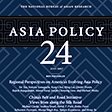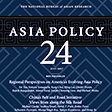(Asia Policy) The Belt and Road Initiative (BRI), announced by Xi Jinping in 2013 and comprising both the Silk Road Economic Belt and the Maritime Silk Road, has provoked admiration for China’s growing economic power but also reluctance to endorse it. In Russia, the Kremlin at first saw the initiative as confirmation of an emerging rivalry with China in the post-Soviet space, especially an attempt to pull the five Central Asian republics away from its sphere of influence.1 BRI was also perceived as a challenge to Russia’s Eurasian Economic Union (EEU), to date the main economic integration structure in the Eurasian space, which has opened up a borderless free market among its member states (Armenia, Belarus, Kazakhstan, Kyrgyzstan, and Russia). Finally, Moscow viewed BRI as a challenge to Russia’s aspiration to serve as a bridge between Europe and Asia, in particular via the Trans-Siberian Railway development project, which could be supplanted by Chinese-built roads and railways bypassing Russia via Central Asia.
In less than two years, however, the Kremlin has largely changed its view. In May 2015, President Vladimir Putin signed a declaration with Xi on a “great Eurasian partnership,” aimed at synchronizing BRI and the EEU. This conciliatory approach is pragmatic: Putin hopes that Russia will profit economically, as well as politically and geopolitically, from BRI and growing Chinese power. For both countries, this agreement is also an opportunity to work together and display their ability to put aside their rivalry, thereby defying the expectations of political experts and media commentators. However, questions about the cohesion of BRI, as well as about the consequences of the increasingly contested Chinese influence in Eurasia and the current tensions between Russia and the West, could make the Kremlin’s new approach to BRI cyclical rather than long-term.
This essay will examine the evolution of the Kremlin’s policy toward BRI. The first section will briefly discuss the potential increase in economic and geopolitical influence that China could gain from this project. It will be
Read More © Asia Policy











